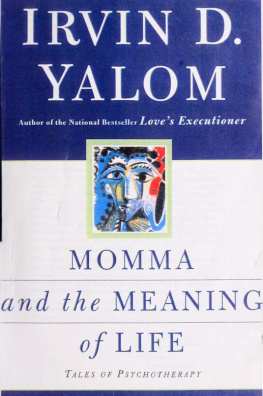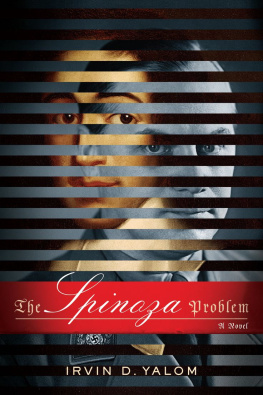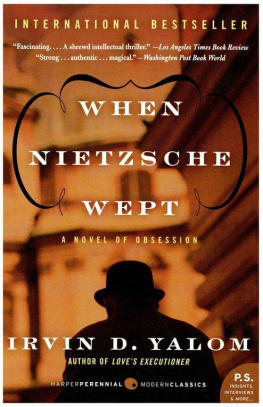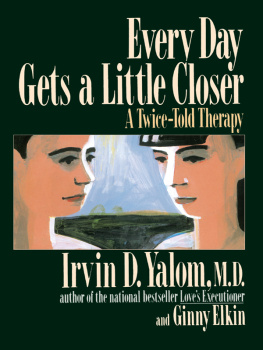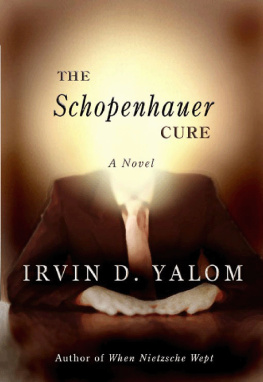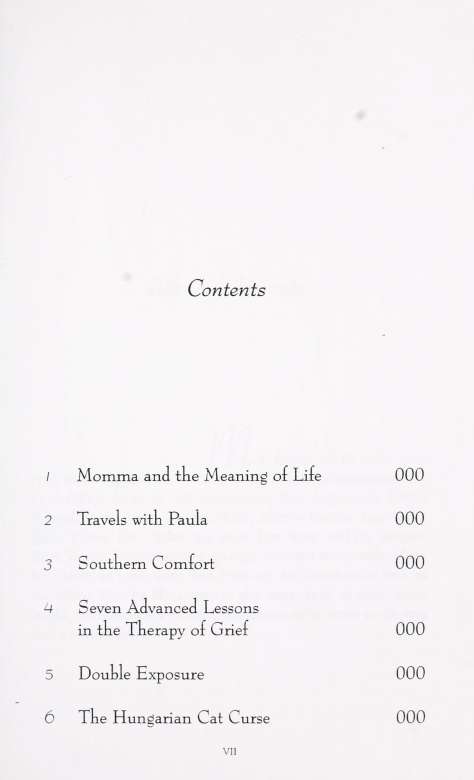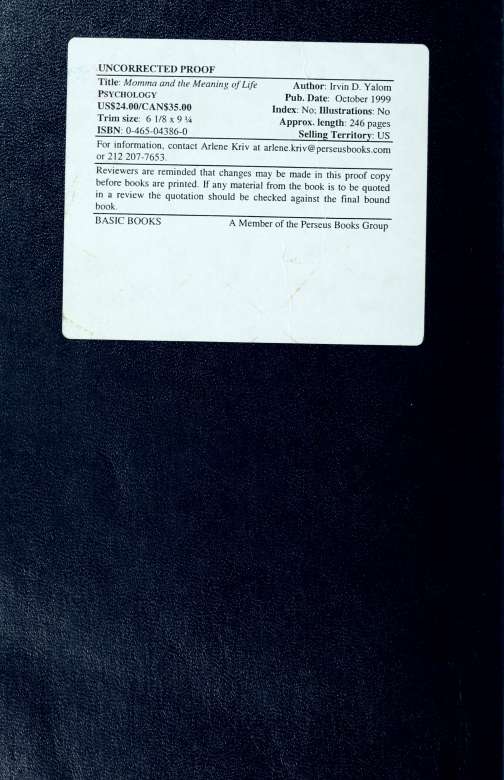This book made available by the Internet Archive.
To Saul Spiro, psychiatrist, poet, artist.
With gratitude for our forty years offiiendshipforty years of sharing
life, books, the creative enterprise, and unwavering skepticism about the
meaning of the whole shebang.
Acknowledgments

y thanks to all who have read, made suggestions, or contributed in some instrumental way to the final form of this manuscript: Sara Lippincott, David Spiegel, David Vann, Jo Ann Miller, Murray Bilmes, Ann Arvin, Katie Weers, Ben Yalom, my sister Jean Rose, and my mother, Ruth Yalom. I am, as always, lovingly indebted to my wife, Marilyn Yalom, in more ways than I can say. And indebted as well, to my editor, Phoebe Hoss, who in this work, as in so many other books, has mercilessly prodded and driven me to write to the very limits of my ability.
op
Momma and the Meaning of Life

usk. Perhaps I am dying. Sinister shapes surround my bed: cardiac monitors, oxygen canisters, dripping intravenous bottles, coils of plastic tubingthe entrails of death. Closing my lids, I glide into darkness.
But then, springing from my bed, I dart out of the hospital room smack into the bright, sunlit Glen Echo Amusement park where, decades past, I spent many summer Sundays. I hear carousel music. I breathe in the moist caramelized fragrance of sticky popcorn and apples. And I walk straight aheadnot hesitating at the Polar Bear Frozen Custard stand or the double dip roller coaster or the Ferris wheelto take my place in the ticket line for the House of Horrors. My fare paid, I wait as the next cart swivels around the corner and clanks to a halt in front of me. After stepping in and pulling down the guard rail to lock myself
snugly into place, I take one last look about meand there, in the midst of a small group of onlookers, I see her.
I wave with both arms and call, loud enough for everyone to hear, "Momma! Momma!" Just then the cart lurches forward and strikes the double doors, which swing open to reveal a black gaping maw. I lean back as far as I can and, before being swallowed by the darkness, call again, "Momma! How'd I do, Momma? How'd I do?"
Even as I lift my head from the pillow and try 7 to shake off the dream, the words clot in my throat: "How'd I do, Momma? Momma, how'd I do?"
But Momma is six feet under. Stone-cold dead for ten years now in a plain pine casket in an Anacostia cemetery outside of Washington, D.C. What is left of her? Only bones, I guess. No doubt the microbes have polished off every scrap of flesh. Maybe some strands of thin gray hair, maybe some glistening streaks of cartilage cling to the ends of larger bones, the femur and the tibia. And, oh yes, the ring. Nestled somewhere in bone dust must be the thin, silver filigree wedding ring my father bought on Hester Street shortly after they arrived in New York, steerage class, from the Russian shtetl half a world away.
Yes, long gone. Ten years. Croaked and decayed. Nothing but hair, cartilage, bones, a silver filigree wedding ring. And her image lurking in my memories and dreams.
Why do I wave to Momma in my dream? I stopped waving years ago. How many? Maybe decades. Perhaps it was that afternoon over half a century ago, when I was eight and she took me to the Sylvan, the neighborhood movie theater around the corner from my father's store. Though there were many empty seats, she plunked herself down next to one of the neighborhood toughs, a boy a year older than I. "That seat's saved, lady," he growled.
"Yeah, yeah! Saved!" my mother replied contemptuously, as she made herself comfortable. "He's saving seats, the big shot!" she announced to everyone in earshot.
I tried to vanish into the maroon velvet seat cushion. Later, in
Momma and the Meaning oj Life
the darkened theater, I summoned courage, turned my head around slowly. There he was, now sitting a few rows back next to his friend. No mistake, they were glaring and pointing at me. One of them shook his fist, mouthed, "Later!"
Momma ruined the Sylvan theater for me. It was now enemy territory. Off limits, at least in daylight. If I wanted to keep up with the Saturday serial Buck Rogers, Batman, The Green Hornet, The Phantom, I had to arrive after the show started, take my seat in the darkness, at the very rear of the theater, as close to an escape door as possible, and depart just before the lights went on again. In my neighborhood, nothing took precedence over avoiding the major calamity of being beaten up. To be punchednot hard to imagine: a bop on the chin, and that's it. Or slugged, slapped, kicked, cutsame thing. But, beaten upohmygod. Where does beaten up end? What's left of you? Beaten-up boys are out of the game, forever pinned with the "got beat up" label.
And waving to Momma? Why would I wave now when, year after year, I lived with her on terms of unbroken enmity? She was vain, controlling, intrusive, suspicious, spiteful, highly opinionated, and abysmally ignorant (but intelligenteven I could see that). Never, not once, do I remember sharing a warm moment with her. Never once did I take pride in her or think, I'm so glad she's my Momma. She had a poison tongue and a spiteful word about everyoneexcept my father and sister.
I loved my Aunt Hannah, my father's sister. Her sweetness, her unceasing warmth, her grilled hot dogs wrapped in crisp bologna slices, her incomparable strudel (its recipe forever lost to me, as her son will not send it to mebut that's another story). Most of all I loved Hannah on Sundays. On that day her delicatessen near the Washington, D.C., Navy Yard was closed, and she put free games on the pinball machine and let me play for hours. She never objected to my putting small wads of paper under the front legs of the machine to slow up the pinballs' descent so I could run up higher scores. My adoration of Hannah sent my Momma into a frenzy of spiteful attacks on her sister-in
law. Momma had her Hannah litany: Hannah's poverty, her aversion to working in the store, her poor business sense, her cloddish husband, her lack of pride and ready acceptance of all hand-me-downs.
Momma's speech was abominable, her English heavily accented and larded with Yiddish terms. She never came to my school for parents' day or for PTA meetings. Thank God! I cringed at the thought of introducing my friends to her. I fought with Momma, defied her, screamed at her, avoided her, and, finally, in my mid-adolescence, stopped speaking to her altogether.
Next page
